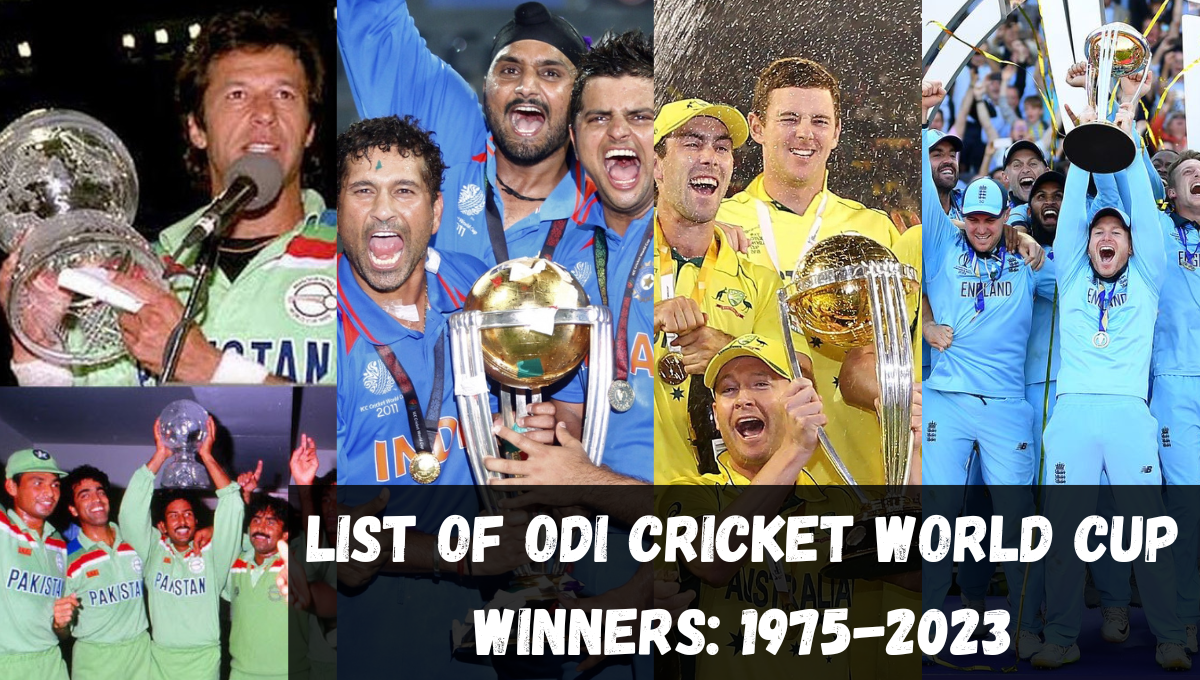When it comes to global sporting events, the One Day International (ODI) Cricket World Cup holds a special place in the hearts of millions. The tournament brings together the world’s best cricket teams to compete for the ultimate title in one-day cricket. Since its inception in 1975, the ODI World Cup has produced countless memorable moments, legendary players, and stories of extraordinary courage and skill. In this article, we’ll journey through history, listing all the ODI Cricket World Cup winners from 1975 to 2023.
A Brief Look at How ODI World Cup Has Evolved
The ODI World Cup started with just eight nations taking part. The competition has since extended, mirroring cricket’s developing worldwide allure. The nature of the game, the opposition, and the sheer energy encompassing the World Cup have just escalated with every release.
Why the ODI World Cup Is Important
In a world progressively divided, games like the ODI World Cup help us to remember the force of a shared objective. The competition doesn’t simply distinguish the best cricketing country; it commends the soul of rivalry, sportsmanship, and worldwide solidarity.
The Ultimate List: ODI World Cup Winners from 1975-2023
Here is a comprehensive table detailing the winners, runner-ups, scores, and hosts for each tournament:
| Year | Host Country | Winner | Score | Runner-up | Score | Result |
|---|---|---|---|---|---|---|
| 1975 | England | West Indies | 291/8 | Australia | 274 | West Indies by 17 runs |
| 1979 | England | West Indies | 286/9 | England | 194 | West Indies by 92 runs |
| 1983 | England | India | 183 | West Indies | 140 | India by 43 runs |
| 1987 | India & Pakistan | Australia | 253/5 | England | 246/8 | Australia by 7 runs |
| 1992 | Australia & NZ | Pakistan | 249/6 | England | 227 | Pakistan by 22 runs |
| 1996 | India, SL & Pak | Sri Lanka | 245/3 | Australia | 241 | Sri Lanka by 4 wickets |
| 1999 | England | Australia | 133/2 | Pakistan | 132 | Australia by 8 wickets |
| 2003 | South Africa | Australia | 359/2 | India | 234 | Australia by 125 runs |
| 2007 | West Indies | Australia | 281/4 | Sri Lanka | 215/8 | Australia by 53 runs |
| 2011 | India, SL & Ban | India | 277/4 | Sri Lanka | 274/6 | India by 6 wickets |
| 2015 | Australia & NZ | Australia | 186/3 | New Zealand | 183 | Australia by 7 wickets |
| 2019 | England | England | 241 | New Zealand | 241/8 | Tie (England won on boundary count) |
| 2023 | India | TBD | TBD | TBD | TBD | TBD |
Decades of Dominance
The 1970s: West Indies’ Era
The initial two releases saw West Indies setting a bar so high that they ruled the ODI cricket scene into the indefinite future. Their successes in 1975 and 1979 were earnest and proclaimed another period in cricket history.
The 1980s and 1990s: Rise of the Subcontinent
India’s unexpected victory in 1983 shocked the world and inspired a nation. Pakistan followed with a win in 1992, and Sri Lanka clinched the title in 1996. This period marked the rise of cricket in the subcontinent, proving that these countries were more than capable of competing at the highest level.
Look At Also: ICC Cricket World Cup 2023 Schedule
The 2000s: Australia’s Unmatched Run
With three titles in succession from 1999 to 2007, Australia displayed a degree of expertise and consistency that was unrivaled. Their players became easily recognized names, and their style of play impacted a totally different age of cricketers.
The 2010s: New Contenders and Classics
India recovered the title in 2011, and Britain at long last lifted the prize in 2019 in a last that is broadly viewed as one of the best matches in cricket history.
What to Expect in 2023
As the sport continues to grow, the 2023 World Cup is eagerly awaited. With T20 leagues grooming young talent like never before, the future editions promise to be even more competitive and exciting.

